TAT Forum
July 2004
![]()
Essays, poems, opinions and humor on seeking
and finding answers to your deepest life-questions
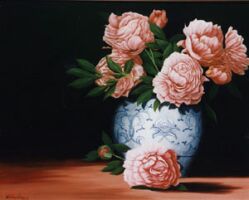
This month's contents: The Way by Richard Rose | On Discipline by Bob Cergol | Poems by Shawn Nevins | First Meeting with Douglas Harding by Shawn Nevins | The Basis of Awareness by Foyan | Renascence by Edna St. Vincent Millay | Why Work? by Bob Fergeson | Tabula Rasa by Pattiann Rogers | Humor | Reader Commentary
|
The Way
by Richard Rose
Listen to the confusion of ignorance. For that which is wisdom belongs to the silent.
Are you of the tumultuous masses that agonize for definition? Then of the human babble of voices, can you hear this voice? For this voice speaks of words, and all words define nothing.
In the abyss there is a path, that is invisible, that leads to the garden. Oh, what foolishness, to speak to the blind, and to those who hear words.
Only those who believe there is a path will ever find one. Only those with faith will find despair. And those who despair may come closer to Truth.
Now you have seen words with two eyes; for one eye will avail thee nothing. Though it is but one thing that thou seekest.
Two people must thou be, man and woman. Either must thou be, and yet neither.
Thou must lose to have, and forsake love to be Love.
 If thy purpose be steadfast and certain, then unto the very goal be sure of nothing. But be certain that the paradox permeates
all. For if thou art certain that thou hast eaten the dragon, and thy stomach feels vast, how much greater is thy nausea if
thou cannot digest or regurgitate.
If thy purpose be steadfast and certain, then unto the very goal be sure of nothing. But be certain that the paradox permeates
all. For if thou art certain that thou hast eaten the dragon, and thy stomach feels vast, how much greater is thy nausea if
thou cannot digest or regurgitate.
That which is important is to know, and to listen to words that will enable thee to know. But logic has only the pretense of knowing.
Then that which is important is feeling, but feeling without testing the feeling, even though it be a feeling of certainty, is but pretense. For even as disease at either end of a nerve renders unreliable feeling, so the subject or object of intuition may be rendered erratically.
So that there is not one without the other. And together they are Being. To know, and to know nothing. To feel, and cease feeling and become.
But before thou knowest nothing, thou must lie with the conceit of knowing. In what bed dost thou lie?
Know thou of salvation? Of Saviors and Adversaries? From what art thou saved? From death? Then know that all men die, even saviors. For it is only by dying that one knows of life. For life has no value until it is lost.
Know thou of faith? Dost thou seize thy mouth that it cry out not against thy ears? To know is to know that which is. To believe is to weave.
Know thou of love? Lovest thou which end of the nerve? Lovest thou thy body or the fat of thy intellect? Hast thou love, or art thou Love?
Know thou of thought? Hast thou proven everything with worded thoughts? Then great is thy vanity. For thou art caught in the whirling hub of the wheel, not in the seat of the chariot.
Know thou of piety? Then thou knowest of right and wrong, and knowing both is sweet sickness, that results from surfeit of impiety. But greater still is he that is both pious and impious, and is neither.
Know thou of teachers? Know that teachers beget teachers, even as words beget words. And if the words of the teacher are kind to the ear, then the ear hears that which it wishes to hear. Then how shall the ear hear of that which IS? For the real teacher speaks neither to the ear, nor the mind, nor the heart, but by circumstances and acts. Yet the real teacher is not a man, and is known only in that circumstances befall us.
Know thou thyself? Art thou the asker of the question or the answerer of thine own questions? Thou art not the quest, and yet first thou must find thyself.
To be the quest, oh soul, thou must first be a seeker. To avoid action, thou must first determine for great action.
Peace to the wanderer.
© Richard Rose. All Rights Reserved.
![]()
On Discipline
by Bob Cergol
A friend passed on the following comment to Bob, which a very successful friend had written: "If I applied the same discipline to spiritual matters that I applied to other aspects of my life, it is hard to believe I wouldn't have made more serious progress."
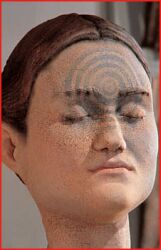 Agreed!—One can't see, if one doesn't LOOK! When I hear people talk about practicing effortless-ness, going with the
flow, living in the now, or living spontaneously as a spiritual practice, it makes my blood boil. Then there's the reality-gap
between what we imagine and what we in fact DO. But what constitutes disciplined effort on the spiritual search? The
tendency is to define it in terms of visible accomplishment, and that dovetails very nicely with the automatic spin
away from inward looking and toward self-affirmation. This includes efforts to say as many Hail Mary's as you can
in one lifetime to earn a final Plenary Indulgence. (Why do they call them "indulgences" anyway?....)
Agreed!—One can't see, if one doesn't LOOK! When I hear people talk about practicing effortless-ness, going with the
flow, living in the now, or living spontaneously as a spiritual practice, it makes my blood boil. Then there's the reality-gap
between what we imagine and what we in fact DO. But what constitutes disciplined effort on the spiritual search? The
tendency is to define it in terms of visible accomplishment, and that dovetails very nicely with the automatic spin
away from inward looking and toward self-affirmation. This includes efforts to say as many Hail Mary's as you can
in one lifetime to earn a final Plenary Indulgence. (Why do they call them "indulgences" anyway?....)
I don't think it's about ease versus difficulty of effort, per se, as much as it's about core motivation and the capacity for self-honesty and the courage to accept the pain of seeming self-diminishment. Of course once you see, you have to live your understanding—and that's not going to be done coasting. Honesty is NOT automatic, or a default mode of seeing. Intense looking with humility seems necessary.
Disciplined people can cover this pain up, hide from it, distract themselves from it through self-affirming, self-magnifying activities. Disciplined people have a better opportunity for awakening failures. Success is their enemy. It can become a vicious circle of escalating and reinforcing attainment. They're trying to run out the clock: ain't gonna happen.... Undisciplined people tend to escape entirely into their bodies. Undisciplined people are closer to their pain because their avoidance strategy is so flimsy and even generates more pain. Failure is their enemy. They take perverted solace in it in a vicious circle of wallowing until, as Rose used to say, they "puddle."
[Your friend]'s success would seem to indicate that he doesn't have a discipline problem. But I wonder if [he] thinks his particular form of escape came any less easy to him than the myriad forms of escape less "disciplined" individuals utilize. Is the core motivational factor at work here really much different? Why can someone muster so much effort to project outwardly yet is unable to project that effort inwardly. If discipline is self-control, then actions counter to our spiritual path cannot be said to be controlled by our true or truer self and therefore are not disciplined. In other words, while [he] may consider himself to have been highly disciplined in his life, and his regret is not in having channeled that discipline in a different direction, perhaps in fact he was lacking in self-discipline, and had he not been so, he would have lived his life as he now implies that he could/should have.
So I guess my point is that true discipline is to endeavor to "retain the identity of the true observer" in all circumstances. That requires great humility ... and great hunger because you have to simultaneously admit your core self-uncertainty and stare dead into it while not getting swept away by the reaction of fear and pain and not retreating into a dream world of your own making.
The spiritual path is not one of acquisition through disciplined effort—but subtraction through disciplined commitment. Precisely how one lives that commitment is a challenge unique to every individual.
![]()
Poems by Shawn Nevins

|
There are layers * I hear birds chatter They were here before and after me. A sound springs forth * "Sounds" Hear these solitary notes reach out * Here are spaces from which we shy away: * I call to you with beauty, * We are holding hands |
![]()
First Meeting with Douglas Harding
by Shawn Nevins
~ Notes from a Spring 1999 workshop
![]()
"Many Are Standing At The Door, But It Is The Solitary Who Will Enter The Bridal Chamber" —The Gospel of Thomas.
That is one of the first quotes that Douglas Harding used at his recent Princeton workshop. He used the image of the door often. A door from the "dark side" to the "side of light." It is a physical door, though, not just an image. Only the Alone can go through that door.
I didn't recognize Douglas when Eric and I walked into the workshop. There were three rows of chairs in an elegant room adorned with portraits of distinguished looking, long-dead, old men. Perhaps eight people were there; all in the second row. It wasn't until we sat down that I realized Eric was sitting next to Douglas. Douglas wore a T-shirt which, with a plant printed on it, looked like it came from a nature center gift shop, a pair of grey dress pants with suspenders, and black shoes with no socks. Oddly, the suspenders were under the T-shirt. I knew he was ninety years old, but he looked in his seventies. About five feet ten, with thinning white hair, a short white beard (thin on the cheeks), he was healthily tanned. He had a hearing aide in each ear and some swelling of his ankles.
Immediately, his lack of ego and his breadth of knowledge impressed me. When someone mentioned they purchased his "large tome," The Hierarchy of Heaven and Earth, Douglas pointed to his stomach and laughingly said, "Yes, I have a large tummy." Douglas quoted from authors I can't remember just two days later. Obviously well read, he used quotes only for emphasis. His own ideas are startlingly fresh.
In the Gospel of Thomas is a clue to the procedure, Douglas said. Only alone are you allowed through the door. "One of the most dangerous words is 'we.' You look at the people around you and say we drink tea. You see them putting tea into a slit with teeth located in an oval mass, and you think you do the same. No, that is out there. In here (pointing his finger to his face), the tea is poured into a clear void. Those faces out there cannot go through the door. Only the One can go through (again pointing to his face)."
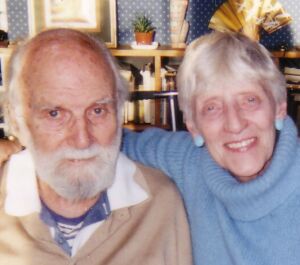 Douglas & Catherine Harding, February 2004
Douglas & Catherine Harding, February 2004
Douglas and his wife Catherine co-led the workshop. Catherine is an elegant looking seventy-year old French woman who married Douglas around ten years ago. Their relationship seems amicable. They kid one another throughout the workshop and occasionally hold hands.
The Hardings spoke for a few minutes to set the stage for the experiments. Douglas said he attempts to move philosophy from "concepts to percepts." There are millions of books filled with inspiring, heavenly ideas, but how do you make them real? The experiments are his key. As he said, this door is a physical door and you (singular) can walk through it and experience the Real. He mentioned that, "You won't get a peak experience, rather it's more like an 'ahhh.' If the gates of heaven open up for you, that's great, but that's not what this is about. It's about seeing the obvious."
In the first experiment, everyone received a piece of cardboard with an oval cutout (large enough for a face) and another smaller oval cutout with a mirror taped to it.
Douglas said there is a wall between the real and the unreal. There is a doorway between as well as a window. The key to the experiments is to observe. See what you see; not what you think or remember or feel or imagine. See like a child. Look in the window (the mirror) and what do you see? "That face is out there, an arm's-length away. Is that you? Is that thing out there what is looking from in here? Now try to go through the wall via the window. Slowly move the mirror toward you and see what happens. Next look through the doorway. Slowly move toward the doorway, until you are through. Notice what you see. You have lost a head and gained a world. Look around you at all these other faces peeking through cardboard like animals in a burrow. Is that you? Hold a mirror in front of you. Does that face looking out of its burrow bear any relationship to your experience. It is out there; not in here [in awareness]."
There I was with my face sticking through a piece of cardboard in a room with twenty other likewise adorned heads, and Douglas telling me I had no head. Crazy, yet my sight verifies his words. I really have never seen my face, or my head. It is always out there. "In mirrors, doorknobs, spoons, and glasses." I have assumed I must have a face like all those others around me. When I look through the cardboard though, I am awareness, and all is within me.
Catherine said your center of gravity shifts from the head to the chest when you do this, but that was not my experience. When they asked for feedback on this experiment, I said I felt my head expand to encompass the world. Catherine said with practice it would shift, but Douglas' attitude was more of, "that's your experience, so I can't debate it."
After a short time for feedback (there was little from the audience), Douglas and Catherine talked before the next experiment. That was the style of the workshop. An experiment, time for questions, a short lecture, another experiment, etc. Douglas addressed the condition of the fellow in the mirror - the "little one" he called it. He said the "little one" couldn't get through the door. "We try to go through the door on the human ticket [by character development], but the human ticket only ends in the morgue." That really resonates with me. I respect any teacher who addresses death; who says plainly that this body is, as Rose said, "A blob waiting to be thrown in a hole so it won't stink up the place."
We did an experiment where we pointed at objects and drew an imaginary circle around them with our finger. This led to pointing to our feet, legs, tummy, chest, and finally outlining the void above out chest. In outlining the void, we outlined the entire world.
Instead of "two holes [eyes] looking out of a meatball," we really have one eye. Make glasses with your fingers and hold them at arm's length. Slowly move them towards you and the two dissolve to become one.
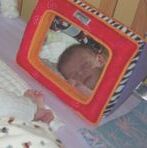 We held up a mirror to our face, turned to our right, and positioned our face onto the body of the person on our right.
"Doesn't that thing look much better there," said Douglas amidst much laughter.
We held up a mirror to our face, turned to our right, and positioned our face onto the body of the person on our right.
"Doesn't that thing look much better there," said Douglas amidst much laughter.
Alas, these experiment produced more of a "hmmm," in me than an "a ha!" At least until the "tube." The tube is a paper tube with three holes in the top and bottom walls for ventilation. You and a partner (or a mirror) place your faces in the ends of the tube. Douglas talks you through the subtle discoveries within the tube. Again, he says to not think, imagine, remember, or feel, just see what you see; be attentive. "Don't believe what I say, find out for yourself."
First, he simply asked us to count how many faces are in the tube. I see one, but immediately think, "No, that can't be, I know there are two." "Don't think, see, you idiot," I tell myself. Douglas had us look at our partner's face, look at the detail, look at how much detail we miss, at how our eyes try to capture the complexity of a human face. "Now, look at your end of the tube. Is there any straining to see? Or is it perfectly clear, an infinite clarity at your end of the tube?"
Douglas called it a de-conditioning tube, and I felt like his voice hypnotized me, or perhaps broke the hypnosis already there. I don't remember all he said, but in the end he had us look into our partner's eyes and look for the consciousness there. "You can't find it, can you. It's not in the eyes or face. But what about your consciousness. That luminous void at your end of the tube. Isn't it large enough, infinite enough, to contain that consciousness at the other end of the tube? That fellow at the other end of the tube—he is you. He is You."
The words "He is You" sent chills up my spine. I felt for a moment that Eric was me. Not that I knew his thoughts, but that this awareness was in both of us. "All of life is confrontation, but where is the need to confront now?" "Nowhere," I thought, "I love this person." Catherine said people have fallen in love in the tube, and I see why. All barriers drop, all facades, your heart is on the table, your games and agendas are laid aside. If that happens with any member of the opposite sex, your bodies will be drawn to one another. If the minds are attuned, then the magnetism of the body will be allowed to come into play. Confrontation keeps people separated; without it they are drawn together. In ordinary life, though, the attunement of the minds disappears and what is left is the hunger of the bodies for one another, or the needs of the personalities.
Toward the end of the day, Douglas did an experiment that didn't use sight as its basis. Unfortunately, we had to close our eyes and I drifted in and out of sleep, so I can't report on its efficacy.
I asked Douglas if we could permanently dwell in this state. "Enlightenment is a trap. You can't rest permanently on the light side. It's like a battery. There are the two poles represented by the light side and the dark side. It's [the light side] always there, like an undercurrent." I wasn't clear on the battery analogy, and I later realized that he contradicts himself in On Having No Head. In that book he speaks of the breakthrough and the window to eternity staying wide open. I discovered the next day that Harding has a bias against the word "enlightenment." He thinks it is a loaded word and doesn't like to use it, so that may explain the contradiction.
To conclude the workshop, Douglas emphasized the need to share the experience. To tell others, but not to preach. He said, "You all are of the third millennium, while I am firmly of the second. You must carry this on." "Not only does sharing it help others, but it helps you."
The next day, I got Eric and myself invited to visit Douglas and Catherine at the home of George Schloss, the workshop organizer. Amazingly, no one else from the workshop was there. Only a couple from New York who missed the workshop took advantage of this opportunity. The seven of us sat in the backyard of George's condo under a shade tree for a magical two and a half hours.
Douglas, in the same T-shirt and dress pants as yesterday, is at ninety far more animated in his speech than I at thirty. Like Rose, there is a presence about him. When he stares at you, as he often does after making a point, his eyes seem to be infinitely deep, and I feel he's looking into my soul. I feel he's had a deep experience. I don't know if it's enlightenment or cosmic consciousness, but it's given him everything he wanted. "Everything my heart could desire is to be found in the center," he said.
I question him about enlightenment and his answer is refreshingly confrontational. "So Shawn here is after enlightenment, which is way up here, while what Douglas is talking about is way down here. So Shawn will forget about what is right here and go after enlightenment. I wish you luck." "Enlightenment is a loaded word which I think is best avoided." Douglas finds that people confuse enlightenment with perfection of the personality. "Perfection of the human is not attainable."
Trying to get some grasp of his experience, I ask if it is possible to reach an end to wondering who you are, what happens after death, etc. "Knowing who you are is attainable," he says.
Are results proportionate to energy applied? "I wouldn't say results are proportionate to the amount of practice, but rather to the passion. You have to have a passion for this. You can have anything you desire if you have passion."
I agree with his point that all life on the dark side is confrontation but am suspect of his point that confrontation dissolves in headlessness. Is this some kind of loving-kindness fantasy? What would you do if you faced a physical confrontation, I ask? "Let's say someone comes at me with a sword and says, 'Douglas, I'm going to cut off your no- head.' What will I do? I don't know. Perhaps I will say, 'Go ahead, I've lived long enough.' Perhaps I will punch them in the nose. I can't say. This is not staged. There's not a preconceived set of rules. There are no rules. I don't know what will happen until I see what Douglas does. Why don't you go ahead and try me and we'll see what happens?" I decline the invitation, satisfied that he is not posing as a saint.
His take on peak experiences is that they are often a distraction. "The spiritual life is not a memory or an anticipation, it is now." Don't chase after experiences; attend to what you see now.
How do you know if you are making progress if there are no signposts, I ask. Is there progress? "Yes and no," he says. "There is no partial seeing of reality. What you see the first time is what you always see. So in that sense there is no progress. However, with practice it does become easier to rest in that seeing, so there is progress of a sort."
Douglas and Catherine had work to do, so we eventually had to leave. Catherine is translating one of his books into French, Douglas is making changes here and there and continually modifying his experiments. Just a few weeks ago, they added the use of the mirror to look at your self as the animal emerging from the burrow in the cardboard door experiment. They are continually busy trying to pass it on. When Eric invited them to speak in Raleigh, Douglas said they would like to, but, "At ninety, I have to be careful about making long-term commitments!"
I wanted to bask all day in his presence. It was so reminiscent of being with Mr. Rose—inspiring, frustrating, challenging, humorous, and real. As we prepared to leave, I noticed Douglas looking at us, shaking his head. I wonder what he saw.
"Everything is the opposite of what you have been told. Are you going to live the hallucination that there are two faces here, or are you going to see what is?"
~ See Shawn's notes, Further Impressions of the Headless Way, from a workshop and visit to Douglas Harding's home during the summer of 1999.
![]()
The Basis of Awareness
by Zen Master Foyan (1067-1120)
E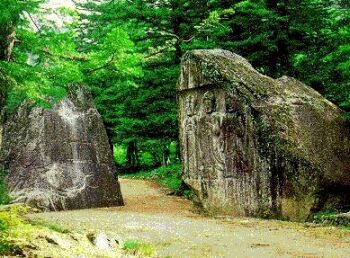 xpand enlightenment, and the mind is always calm; go along with things, and consciousness runs at a gallop.
I only wish to be rich in enlightenment though personally poor, generous with virtue though emotionally aloof.
xpand enlightenment, and the mind is always calm; go along with things, and consciousness runs at a gallop.
I only wish to be rich in enlightenment though personally poor, generous with virtue though emotionally aloof.
Here, I am thus every day, thus all the time. But tell me, what is "thus"? Try to express it outside of discriminatory consciousness, intellectual assessments, and verbal formulations.
This reality is not susceptible to your intellectual understanding. Now those who think, attend, and reflect all have some intellectual understanding; but then when they turn back to examine their own eyes and think of the mind that thinks, at this point why do people unknowingly say, "It has never been blue, yellow, red, or white; it has no appearance, no form"? I tell you, this is what I call talk; it is not your original mind.
How can you think of your original mind? How can you see your own eye? When you are looking inward, furthermore, there is no seeing subject. Some people swallow this in one gulp, so their eye of insight opens wide and they immediately arrive at their homeland. How can people nowadays reach the point where there is no seeing and no hearing? Everything is always there; you see people, houses, and all sorts of forms, like boiling water bubbling.
When you were infants, you also heard sounds and saw forms, but you didn't know how to discriminate. Once you came to the age of reason, then you listened to discriminatory thinking, and from that time on have suffered a split between the primal and the temporal. At this point, it is inevitably hard for people to restore natural order even if they want to. Those who attain enlightenment do not see walking when they walk, and do not see sitting when they sit. That is why the Buddha said, "The eyes seeing forms is equivalent to blindness; the ears hearing sounds is equivalent to deafness."
How can we say we are as if blind and deaf? When we hear sound, there is no sound to be heard; when we see form, there is no form to be seen. What we see and hear is all equivalent to an echo. It is like seeing all sorts of things in a dream—is there all that when you wake up? If you say yes, yet there's only the blanket and pillow on the bed; if you say no, yet all those things are clearly registered in your mind, and you can tell what they were. The same is true of what you see and hear now in broad daylight.
So it is said, what can be seen by the eye or heard by the ear can be studied in the scriptures and treatises; but what about the basis of awareness itself—how do you study that?
~ Foyan's teaching, excerpted from "Instant Zen: Waking Up in the Present," translated by Thomas Cleary
![]()
Renascence
by Edna St. Vincent Millay
|
ALL I could see from where I stood The sky, I thought, is not so grand; I screamed, and—lo!—Infinity Long had I lain thus, craving death, Deep in the earth I rested now; The rain, I said, is kind to come I ceased; and, through the breathless hush I know not how such things can be The world stands out on either side |
![]()
Why Work?
by Bob Fergeson
"The challenge is to persist in this work till the secret meaning is secret no longer, but obvious. Thus encouraged let's get down to work at once." —Douglas Harding
"The ego is one of the biggest obstructions to the achievement of anything." —Richard Rose
Much is being said of late of the value of work or practice in spiritual awakening. Proponents on both sides of the argument can agree on only one thing: that there is something to attain above and beyond the normal state of ego-attachment and its resultant misery. But should we work and strive towards this goal? Or should we simply take the path of least resistance, and hearing that we are already enlightened but just don't know it, make effortlessness our path? The confusion that springs from this seeming disagreement is illusory, as is the problem itself. The solution is in the definition of work, and of what is being worked on. Let's take a look at this from both sides, and see if we can come to a better understanding.
First, let's look at what does not constitute spiritual work but is nevertheless practice for many. Herein lies the trap of what is called compensation, or ego-survival. As infants, we are relatively innocent, clear, so to speak, and have not yet learned the games of compromise we will later deem necessary for our survival in society. We have many excellent teachers waiting to begin our education in life, consisting of parents, teachers, siblings, relatives, and any other looming figure who has not done any real work on themselves. Soon, they have convinced us that not only do we exist, but we are a thing, defined not only by what is inside our hide, but also by what others tell us we are, and even by what they think. We are kept guessing at this ever-changing definition, never getting it quite right but, under the relentless pressure of society, we are taught we must keep at it. Eventually, with the onset of puberty and sex, we are hopelessly trapped in a box of our own belief, which must be continually re-created and maintained for our very survival, or so we have been led to believe.
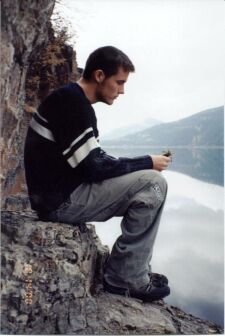 This process of compromise and outright degradation forces us to create what is commonly called "the unconscious."
This functions as a trash receptacle in which every thought and feeling which does not fit the acquired pattern is
sent: "out of sight, out of mind." These articles of "garbage" are not destroyed but kept in limbo, and some may
be very much alive and active, though we cannot let ourselves be aware of this. A few examples: it could be that
a person has a state of mind, inherited, that he must be successful and "better than," though he
may not even be of average intelligence and lacks worldly ambition. He cannot let himself see this contradiction,
for it would threaten his very sense of individuality. Any event that would point out the facts of the matter must be
put out of sight. Another may have acquired an ideal which runs counter to nature and desire, and which boosts the
person's ego by giving them virtues they may not really possess. When the person acts or thinks contrary to the
assumed pattern, it cannot be allowed into the light of day but must be repressed. We all have a
near infinite variety of these beliefs, which we insist on as fact, though the facts about ourselves are something
we know precious little about.
This process of compromise and outright degradation forces us to create what is commonly called "the unconscious."
This functions as a trash receptacle in which every thought and feeling which does not fit the acquired pattern is
sent: "out of sight, out of mind." These articles of "garbage" are not destroyed but kept in limbo, and some may
be very much alive and active, though we cannot let ourselves be aware of this. A few examples: it could be that
a person has a state of mind, inherited, that he must be successful and "better than," though he
may not even be of average intelligence and lacks worldly ambition. He cannot let himself see this contradiction,
for it would threaten his very sense of individuality. Any event that would point out the facts of the matter must be
put out of sight. Another may have acquired an ideal which runs counter to nature and desire, and which boosts the
person's ego by giving them virtues they may not really possess. When the person acts or thinks contrary to the
assumed pattern, it cannot be allowed into the light of day but must be repressed. We all have a
near infinite variety of these beliefs, which we insist on as fact, though the facts about ourselves are something
we know precious little about.
Now we are getting close to seeing what can happen when we decide that "work on ourselves" is simply more of the above self-deception. We may see that we are built of contradictions, many of which are dualities of unconscious actions or beliefs, with their conscious compensations. We may decide that the solution is in reinforcing or strengthening these compensations while hiding their causes. We then label this as "spiritual work." Many are the traps that lie in this pit of deceit. What if we are attracted to a Guru simply because we still unconsciously crave Daddies' approval? What will we do, as far as practice is concerned, if the Guru sees this and refuses the game? What if we are driven to spiritual work by inner anxiety and succeed in finding just the right compensation in a prescribed method of distraction (meditation), become "peaceful," and all striving stops, far short of the Goal?
All of the above is simply the ego desperately trying to survive, regardless of the facts. True practice is that which helps us to see our tricks of self-delusion and thus reveals our sense of individuality, not reinforces it. We have filled our hearts with garbage and cannot allow ourselves to admit it. We may have now become that which we despised at a much earlier age and can no longer even recognize ourselves. A method of real work would be one that helps us to not only face these errors, but one which helps us rid our soul of its burden of false identity. Our very sense of existing as a thing, i.e. the ego, must be dealt with, not reinforced. Here is where true effort and practice comes into play. As we are, we are not capable of recognizing the simple truths about our "self," much less that of the Truth of our Self, as we really are.
Cleaning the machine, or ridding ourselves of the acquired patterns and beliefs that bind us in self-deception, endless compensation and stagnation, is true work. We must begin to face our fact-status and lose the false "selves" that keep us asleep. We hear often from the teachers of old that a quiet mind is key to spiritual attainment. This is not simply the projecting of one thought or a pattern of thoughts to drown out the raging turmoil that may lie within. The possibility of Becoming starts with a quiet mind, which in turn is the result of facing this buried turmoil, of facing our buried conscience, and relieving ourselves of the unconscious and its contents by bringing them up into the Light of our own Mind.
Spiritual work does not lie in the building up of the ego. That is the job of life and society. Given this, those are right who insist we must simply listen to the silence, and all will be done. The work is in ridding ourselves of that which is false and returning to our innocence, "as little children." By this, those who would have us work are right. Can you truly say you are beyond ego, the false-self, and have nothing to do but wait for the Light of the Self to illuminate you? If not, and you admit that life has had an effect on your mind and soul, then practice.
~ See Bob's web sites, The Mystic Missal, NostalgiaWest, and The Listening Attention.
![]()
Tabula Rasa
by Pattiann Rogers
|
The landscape in this country is entirely above the sky-smooth lake, in and out seeming like the prints of thorny grass spider. This is a dull, unbroken scape, of a rooster's occasional "chicchirichi," gull, two glassy prongs of woodland emerges an imagination lacking all and its glistening swill, a vista of gull's eye |
![]()
Humor...
"Wine is sure proof that God loves us and wants us to be happy." ~ Ben Franklin
Reader Commentary:
Wow. WOW! This gives new meaning to the notion I have of how people "LOOK AWAY" from what is staring them in the face—DEATH! If this is what can happen at the moment one is confronted inescapably with death—and I think it is accurate, then can you imagine the flights of fancy and retreats into dreams that the human race engages in when the attention is left to drift without focus?! I had no idea what a genius of writing Bierce was, not to mention the depth of his insight. Surely it wasn't just his imagination working on a clever idea for a story. ~ Bob Cergol
|
Sign up for our e-mail alert that will let you know when new issues are published. Contact the Forum for questions, comments or submissions. Want to help? Your donation of $5 or more will support the continuation of the Forum and other services that the TAT Foundation provides. TAT is a 501(c)(3) not-for-profit educational organization and qualifies to receive tax-deductible contributions. Or, download this .pdf TAT Forum flyer and post it at coffee shops, bookstores, and other meeting places in your town, to let others know about the Forum. |

